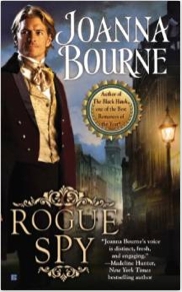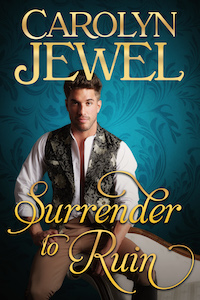Interview and Giveaway With Jo Bourne
Welcome to the Risky Regencies, Jo Bourne! I am so excited to have you here to visit. Please, do come down from the pedestal I keep you on…
About Jo Bourne
Joanna lives in the foothills of the Blue Ridge with her family, a medium-sized mutt and a faux Himalayan cat. She writes Historical Romances set in England and France during the Napoleonic Wars.
She’s fascinated by that time and place – such passionate conviction and burning idealism … and really sexy clothes.
Where to Find Jo
Website: http://www.joannabourne.com/
Blog: http://jobourne.blogspot.com/
Facebook: https://www.facebook.com/joanna.bourne.5
Twitter: https://twitter.com/jobourne
About Rogue Spy
Ten years ago he was a boy, given the name Thomas Paxton and sent by Revolutionary France to infiltrate the British Intelligence Service. Now his sense of honor brings him back to London, alone and unarmed, to confess. But instead of facing the gallows, he’s given one last impossible assignment to prove his loyalty.Lovely, lying, former French spy Camille Leyland is dragged from her safe rural obscurity by threats and blackmail. Dusting off her spy skills, she sets out to track down a ruthless French fanatic and rescue the innocent victim he’s holding—only to find an old colleague already on the case. Pax.
Old friendship turns to new love, and as Pax and Camille’s dark secrets loom up from the past, Pax is left with a choice—go rogue from the Service or lose Camille forever. . .
Read an excerpt: http://www.joannabourne.com/
Our Risky Interview
Q: At the Riskies, we love research stories. Can you tell us about some of the research you did for this book?
The problem with talking about research in a book that’s hitting the shelf now, is that I wrote it and did the research for it a year or more ago. I have trouble remembering the research I did last Tuesday, (hint: it was about small rivers in Kent,) let alone what I was looking at in April a year ago.
I do remember Rogue Spy was stuffed with foreign language — Latin and Italian mostly — but with odd bits of this and that tucked in various places. I spent the whole writing year up to my keister in lists of Latin phrases, trying to find something Classical that would work in my dialog.
The Italian about drove me crazy. (Note to fellow writers — Google Translate is NOT sufficient.) I am soooo glad I was using Tuscan, the mother of modern Italian, rather than some other two-century-old Italian dialect.
Can I give a shout out to my publisher, Berkley? They gave me a copyeditor who apparently spoke all these languages (or knew how to do really good language research.) Anything I got right, the copyeditor did it.
Q: Have you ever come across a historical fact where you just went “Huh. Who’d a thunk it?”
One factoid that struck me recently . . .
In the Work in Progress I send my protagonists riding through deserted stretches of countryside, headed from London to the southeast coast of England. The Dover to Folkestone area.
Did you know the big road running down to Dover and Folkestone is a Roman road?
Okay. Okay. Everybody else in the world probably knows this. Maybe I even knew this. But I’d never thought about it.
The A2, Dover to London Road, is Watling Street, a Celtic trackway that was there when the Romans invaded and started paving everything. This is probably the road Chaucer’s Pilgrims travelled.
That was all not-so-useful factoid because I didn’t use the A2. My action was better suited to the A20.
I spend a lot of my time looking at period maps.
Q: Have you ever wanted to write in another historical period?
If I couldn’t write Regency/Napoleonic War books — let’s say the market dried up or became saturated or whatever — I’d probably scuttle over to Urban Fantasy. It would be such a relief not doing half an hour’s research to find out when the bridge in Farningham, Kent was built. (It’s Medieval.)
If I were going to write in another historical period . . . Classical Rome. What delightful, ruthless, aristocrats. What politics. What clash of ideals.
Did I mention the really cool Roman clothing?
Q: Read any good books lately?
Oh yes. Yes. Let me list a few Historical Romances that just came out or are about to:
- Grace Burrowes, What a Lady Needs for Christmas.
- Donna Thorland, Mistress Firebrand. (Okay. That’s not actually out yet.)
- Mary Jo Putney, Not Quite a Wife.
- Jeannie Lin, Gunpowder Alchemy. (Umm … that’s another one not quite on the shelves.)
- Shana Galen, Love and let Spy.
Q: Volcanoes. For or against?
One has to applaud the showmanship. The edge-of-the-chair anticipation. The brilliant reds and oranges. The ionized lightning that flashes from the ominous plumes of black rising to the sky.
On the other hand, there’s the possibility one of them may bring civilization, as we know it, to an end. Or destroy all life on earth.
Not good.
So I’m fence-sitting on this topic.
Q: Favorite historical weapon?
Black, well-honed, carefully balanced throwing knives. They are not so much weapons as works of art. But you knew I was going to say that.
Q: What’s next for you?
I’m working fitfully and with varying levels of success on the Séverine story. We will see how that comes out. Eventually.
Giveaway
We’re giving away three copies of Rogue Spy! Digital or print, winner’s choice.
Rules: Void where prohibited. No purchase necessary. Must be 18 to enter. For a digital copy, you need to be able to accept a gift card from a US-based vendor.
Winner chosen at random from among the commenters at the blog. Comment before midnight Eastern, Friday, October 31, 2014. Alternate winners will be chosen for winners who do not reply to my notification after 10 days.
To enter, comment with your guess as to Jo’s favorite color. (Being right or wrong on this has no bearing on your chances of winning, so feel free to be creative.) Like, “Jo Bourne’s favorite color is the soft blue of the sky at dusk.”



